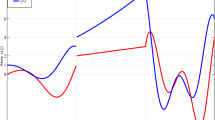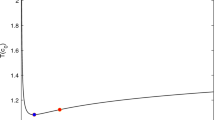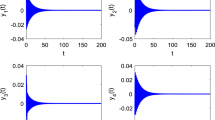Abstract
This paper deals with the problem of mixed \(H_\infty \)/passive projective synchronization for two different fractional-order (FO) neural networks with uncertain parameters. Firstly, a fractional integral sliding surface which is suitable for the considered FO error system is proposed. Secondly, in terms of the established sliding surface, combining a novel reaching law, a new adaptive sliding mode control law is introduced, which can force the closed-loop dynamic error system trajectories to reach the sliding surface. Then, a continuous frequency distributed model of the FO dynamic networks is given, via the application of FO system stability theory and robust control, the projective synchronization conditions are addressed in terms of linear matrix inequality techniques. Based on the conditions, a desired controller which can guarantee the robust stability of the closed-loop system and also ensure a mixed \(H_\infty \)/passive performance level is designed. Finally, synchronization of two nonidentical FO neural networks with uncertain parameters as a simulation example is given to illustrate the effectiveness and advantages of the proposed method.










Similar content being viewed by others

References
Xu S, Lam J (2006) A new approach to exponential stability analysis of neural networks with time-varying delays. Neural Netw 19(1):76–83
Wang Z, Liu Y, Li M et al (2006) Stability analysis for stochastic Cohen–Grossberg neural networks with mixed time delays. IEEE Trans Neural Netw 17(3):814–820
Rakkiyappan R, Cao J, Velmurugan G (2015) Existence and uniform stability analysis of fractional-order complex-valued neural networks with time delays. IEEE Trans Neural Netw Learn Syst 26(1):84–97
Zhang B, Lam J, Xu S (2015) Stability analysis of distributed delay neural networks based on relaxed Lyapunov–Krasovskii functionals. IEEE Trans Neural Netw Learn Syst 26(7):1480–1492
Chen D, Zhang R, Sprott JC et al (2012) Synchronization between integer-order chaotic systems and a class of fractional-order chaotic system based on fuzzy sliding mode control. Nonlinear Dyn 70(2):1549–1561
Aghababa MP (2014) Fractional modeling and control of a complex nonlinear energy supply-demand system. Complexity 20(6):74–86
Wang Z, Huang X, Shi G (2011) Analysis of nonlinear dynamics and chaos in a fractional order financial system with time delay. Comput Math Appl 62(3):1531–1539
Podlubny I (1999) Fractional-order systems and \(PI^{\lambda }D^{\mu }\)-controllers. IEEE Trans Autom Control 44(1):208–214
Wang Z (2013) A numerical method for delayed fractional-order differential equations. J Appl Math 2013(2):707–724
Wang H, Yu Y, Wen G (2014) Stability analysis of fractional-order Hopfield neural networks with time delays. Neural Netw 55:98–109
Wang F, Yang Y, Hu M (2015) Asymptotic stability of delayed fractional-order neural networks with impulsive effects. Neurocomputing 154:239–244
Wu R, Hei X, Chen L (2013) Finite-time stability of fractional-order neural networks with delay. Commun Theor Phys 60(2):189–193
Yang X, Song Q, Liu Y et al (2015) Finite-time stability analysis of fractional-order neural networks with delay. Neurocomputing 152:19–26
Yang X, Li C, Song Q et al (2016) Mittag-Leffler stability analysis on variable-time impulsive fractional-order neural networks. Neurocomputing 207:276–286
Chen J, Zeng Z, Jiang P (2014) Global Mittag-Leffler stability and synchronization of memristor-based fractional-order neural networks. Neural Netw 51:1–8
Pecora LM, Carroll TL (1990) Synchronization in chaotic systems. Phys Rev Lett 64:821–824
Bagheri P, Shahrokhi M (2016) Neural network-based synchronization of uncertain chaotic systems with unknown states. Neural Comput Appl 27(4):945–952
Mohammadzadeh A, Ghaemi S (2015) Synchronization of chaotic systems and identification of nonlinear systems by using recurrent hierarchical type-2 fuzzy neural networks. ISA Trans 58:318–329
Mainieri R, Rehacek J (1999) Projective synchronization in three-dimensioned chaotic systems. Phys Rev Lett 82:3042–3045
Jia Q (2007) Projective synchronization of a new hyperchaotic Lorenz system. Phys Lett A 370:40–45
Wang ZL (2010) Projective synchronization of hyperchaotic Lü system and Liu system. Nonlinear Dyn 59(3):455–462
Agrawal SK, Srivastava M, Das S (2012) Synchronization of fractional order chaotic systems using active control method. Chaos Solitons Fractals 45(6):737–752
Wang X, Zhang X, Ma C (2012) Modified projective synchronization of fractional-order chaotic systems via active sliding mode control. Nonlinear Dyn 69(1–2):511–517
Andrew LYT, Li XF, Chu YD et al (2015) A novel adaptive-impulsive synchronization of fractional-order chaotic systems. Chin Phys B 24(10):86–92
Ding L (2009) Projective synchronization of fractional-order chaotic systems based on sliding mode control. Acta Phys Sin 58(6):3747–3752
Bai J, Yu Y, Wang S et al (2012) Modified projective synchronization of uncertain fractional order hyperchaotic systems. Commun Nonlinear Sci Numer Simul 17(4):1921–1928
Zhou P, Zhu W (2011) Function projective synchronization for fractional-order chaotic systems. Nonlinear Anal Real World Appl 12(2):811–816
Yang YH, Xiao J, Ma ZZ (2013) Modified function projective synchronization for a class of partially linear fractional order chaotic systems. Acta Phys Sin 62(18):116–121
Bao H, Cao J (2015) Projective synchronization of fractional-order memristor-based neural networks. Neural Netw 63:1–9
Yu J, Hu C, Jiang H et al (2014) Projective synchronization for fractional neural networks. Neural Netw 49:87–95
Zhang R, Yang S (2013) Robust synchronization of two different fractional-order chaotic systems with unknown parameters using adaptive sliding mode approach. Nonlinear Dyn 71(1–2):269–278
Yin C, Dadras S, Zhong SM et al (2013) Control of a novel class of fractional-order chaotic systems via adaptive sliding mode control approach. Appl Math Model 37(4):2469–2483
Zhou P, Ding R (2012) Adaptive function projective synchronization between different fractional-order chaotic systems. Indian J Phys 86(6):497–501
Xi H, Li Y, Huang X (2015) Adaptive function projective combination synchronization of three different fractional-order chaotic systems. Optik Int J Light Electron Opt 126(24):5346–5349
Wu H, Wang L, Wang Y et al (2016) Global Mittag-Leffler projective synchronization for fractional-order neural networks: an LMI-based approach. Adv Differ Equ 2016(1):1–18
Wu L, Su X, Shi P (2012) Sliding mode control with bounded \({\fancyscript {L}}\)2 gain performance of Markovian jump singular time-delay systems. Automatica 48(8):1929–1933
Niu Y, Wang X (2009) Sliding mode control design for uncertain delay systems with partial actuator degradation. Int J Syst Sci 40(4):403–409
Lin TC, Lee TY (2011) Chaos synchronization of uncertain fractional-order chaotic systems with time delay based on adaptive fuzzy sliding mode control. IEEE Trans Fuzzy Syst 19(4):623–635
Lin TC, Lee TY, Balas VE (2011) Adaptive fuzzy sliding mode control for synchronization of uncertain fractional order chaotic systems. Chaos Solitons Fractals 44(10):791–801
Shen H, Xu S, Lu J et al (2012) Passivity-based control for uncertain stochastic jumping systems with mode-dependent round-trip time delays. J Frankl Inst 349(5):1665–1680
Gao H, Chen T, Chai T (2007) Passivity and passification for networked control systems. SIAM J Control Optim 46(4):1299–1322
Kuntanapreeda S (2016) Adaptive control of fractional-order unified chaotic systems using a passivity-based control approach. Nonlinear Dyn 84(4):2505–2515
Song X, Xu S, Shen H (2008) Robust \(H_\infty \) control for uncertain fuzzy systems with distributed delays via output feedback controllers. Inf Sci 178(22):4341–4356
Xu S, Chen T, Lam J (2003) Robust \(H_\infty \) filtering for uncertain Markovian jump systems with mode-dependent time delays. IEEE Trans Autom Control 48(5):900–907
Shen J, Lam J (2014) State feedback \(H_\infty \) control of commensurate fractional-order systems. Int J Syst Sci 45(3):363–372
Shen J, Lam J (2014) \(H_\infty \) model reduction for positive fractional order systems. Asian J Control 16(2):441–450
Mohammadzadeh A, Ghaemi S, Kaynak O (2016) Robust H-infinity based synchronization of the fractional order chaotic systems by using new self-evolving non-singleton type-2 fuzzy neural networks. IEEE Trans Fuzzy Syst 24(6):1544–1554
Mathiyalagan K, Park JH, Sakthivel R et al (2014) Robust mixed \(H_\infty \) and passive filtering for networked Markov jump systems with impulses. Signal Process 101:162–173
Shen H, Wu ZG, Park JH (2015) Reliable mixed passive and \(H_\infty \) filtering for semi-Markov jump systems with randomly occurring uncertainties and sensor failures. Int J Robust Nonlinear Control 25(17):3231–3251
Su L, Shen H (2015) Mixed \(H_\infty \)/passive synchronization for complex dynamical networks with sampled-data control. Appl Math Comput 259:931–942
Podlubny I (1999) Fractional differential equations. Academic Press, San Diego
Xie L (1996) Output feedback \(H_\infty \) control of systems with parameter uncertainty. Int J Control 63(4):741–750
Ding Z, Shen Y (2016) Projective synchronization of nonidentical fractional-order neural networks based on sliding mode controller. Neural Netw 76:97–105
Gai M, Cui S, Liang S et al (2016) Frequency distributed model of Caputo derivatives and robust stability of a class of multi-variable fractional-order neural networks with uncertainties. Neurocomputing 202:91–97
Cao J, Xiao M (2007) Stability and Hopf bifurcation in a simplified BAM neural network with two time delays. IEEE Trans Neural Netw 18(2):416–430
Lu H (2002) Chaotic attractors in delayed neural networks. Phys Lett A 298(2):109–116
Bao H, Park JH, Cao J (2016) Synchronization of fractional-order complex-valued neural networks with time delay. Neural Netw 81:16–28
Wu L, Su X, Shi P (2015) Dissipativity analysis and synthesis of discrete-time T–S fuzzy stochastic systems. In: Fuzzy control systems with time-delay and stochastic perturbation. Springer, Berlin, pp 185–212
Song X, Liu L, Balsera IT et al (2016) Output feedback control for fractional-order Takagi–Sugeno fuzzy systems with unmeasurable premise variables. Trans Inst Meas Control 38(10):1201–1211
Acknowledgements
This work is partially supported by National Natural Science Foundation of China (Nos. 61203047, U1604146), Science and Technology Research Project in Henan Province (Nos. 152102210273, 162102410024) and Foundation for the University Technological Innovative Talents of Henan Province (No. 18HASTIT019). The second author would like to sincerely thank Prof. Om P. Agrawal and Prof. R. Koc (Chair), Mechanical Engineering and Energy Processes, Southern Illinois University for hosting her during April 8, 2016 to April 7, 2017.
Author information
Authors and Affiliations
Corresponding author
Rights and permissions
About this article
Cite this article
Song, S., Song, X. & Balsera, I.T. Mixed \(H_\infty \)/Passive Projective Synchronization for Nonidentical Uncertain Fractional-Order Neural Networks Based on Adaptive Sliding Mode Control. Neural Process Lett 47, 443–462 (2018). https://doi.org/10.1007/s11063-017-9659-6
Published:
Issue Date:
DOI: https://doi.org/10.1007/s11063-017-9659-6



